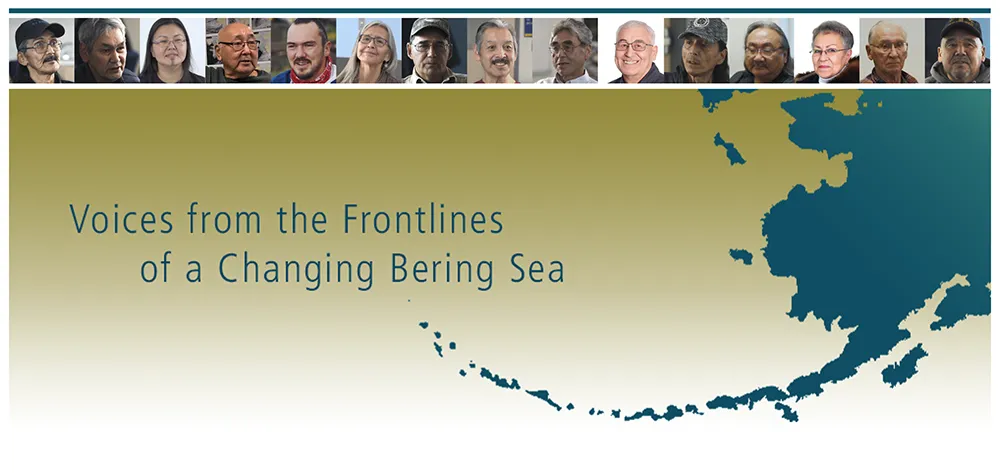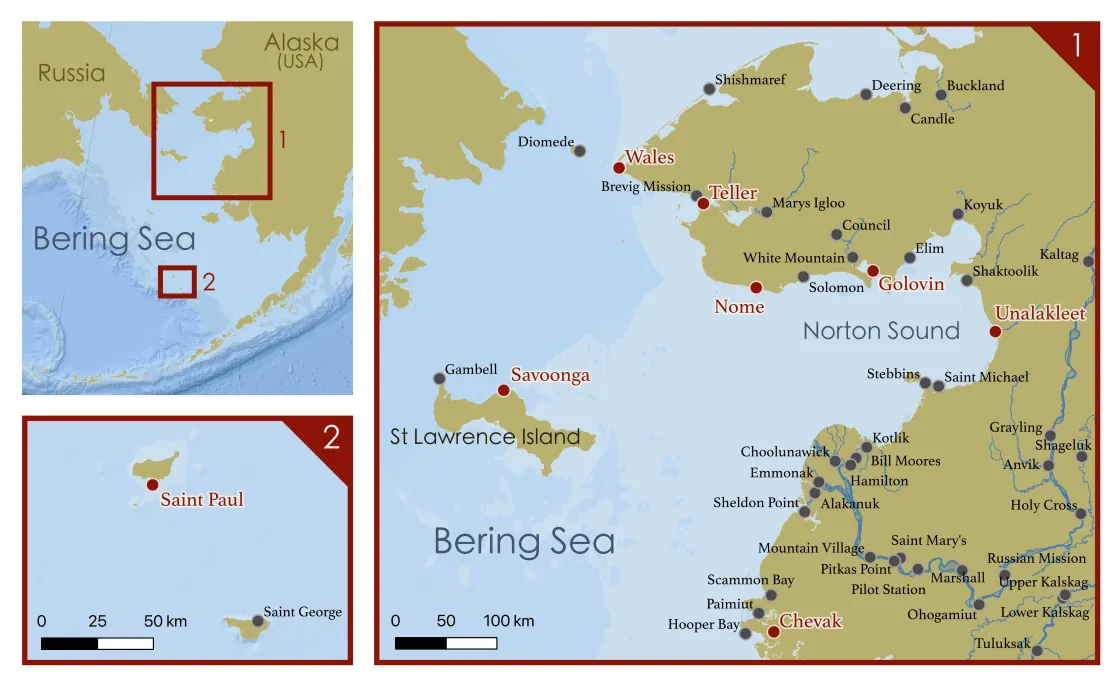Bering Sea Voices
About the Project
About 'Voices from the Frontlines of a Changing Bering Sea'
The Bering Sea is home to over 70 Indigenous communities of the Iñupiat, Central Yup’ik, Cup’ik, St. Lawrence Island Yupik, Unangan, and Chukchi Peoples. In recent years, the Bering Sea has experienced unprecedented declines in sea ice, threatening community food security, infrastructure, and travel. In winters 2018 and 2019, sea ice coverage was by far the lowest observed in at least the last 160 years. Such loss of ice, together with increasing air temperatures, and recent winter storm activity, has shifted much focus to the region with renewed questions regarding how local communities and ecosystems are affected.
In 2019, scientists from the Study of Environmental Arctic Change (SEARCH) partnered with the Bering Sea Elders Group (BSEG) to create opportunities for Elders to communicate their experiences and knowledge regarding rapid environmental change across their region. In September 2019, ten Elders from eight communities came together for a two-day, round-table gathering in Nome, Alaska, to share their perspectives, observations, and stories about what sea ice loss means to their villages, the resources they depend on, and their collective future as Arctic Indigenous Peoples.
The following resulted from this collaboration:
- An Indigenous community contribution to the 2019 Arctic Report Card, which is an annual report on the state of the Arctic environment, led by the National Oceanic and Atmospheric Administration (NOAA)
- After the Ice—a short three-part film series to communicate Bering Sea community perspectives on sea ice loss
Acknowledgements
We foremost recognize the Bering Sea Elders and community members that participated in this project. These individuals and their respective home communities are: Robert Bahnke (Nome), Helen Bell (Nome), Tom and Beejay Gray (Nome), Nick Hanson (Unalakleet), Clarence Irrigoo (Gambell), Jerry Ivanoff (Unalakleet), Frank Katchatag (Unalakleet), Chris Kanooka (Gambell), Norman Menadelook Sr. (Teller), Jacob Merculief (St. Paul Island), Andrew Miller (Nome), Ralph Olanna (Nome), Carol Oliver (Golovin), Clyde Oxereok (Wales), Delbert Pungowiyi (Savoonga), Richard Slats (Chevak), and Aqef Waghiyi (Savoonga).
A special thanks is owed to Mellisa Johnson. As the BSEG Executive Director, Mellisa helped to shepherd the project through the necessary approval processes, identify the participating Elders, and outwardly share what was learned and documented throughout the project.
We are very grateful to the University of Alaska Fairbanks (UAF) Northwest Campus in Nome, Alaska, especially Barb QasuGlana Amarok and Mariah Morgan, for hosting this project’s gathering of Bering Sea Elders in September 2019.
Contact
For more information about this project, please contact Druckenmiller@colorado.edu.
Matthew Druckenmiller is a research scientist at the National Snow and Ice Data Center (NSIDC) at the University of Colorado Boulder, USA.
Funding
Primary project funding was provided by the Study of Environmental Arctic Change (SEARCH), which is supported by a collaborative grant from the National Science Foundation Division of Polar Programs, Arctic Sciences Section (Grant No. 1331100). Any opinions, findings, conclusions, or recommendations expressed throughout this project’s materials do not necessarily reflect the views of the National Science Foundation.



